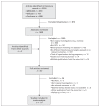Effects of intensive blood pressure lowering on the progression of chronic kidney disease: a systematic review and meta-analysis
- PMID: 23798459
- PMCID: PMC3735743
- DOI: 10.1503/cmaj.121468
Effects of intensive blood pressure lowering on the progression of chronic kidney disease: a systematic review and meta-analysis
Abstract
Background: Recent guidelines suggest lowering the target blood pressure for patients with chronic kidney disease, although the strength of evidence for this suggestion has been uncertain. We sought to assess the renal and cardiovascular effects of intensive blood pressure lowering in people with chronic kidney disease.
Methods: We performed a systematic review and meta-analysis of all relevant reports published between 1950 and July 2011 identified in a search of MEDLINE, Embase and the Cochrane Library. We included randomized trials that assigned patients with chronic kidney disease to different target blood pressure levels and reported kidney failure or cardiovascular events. Two reviewers independently identified relevant articles and extracted data.
Results: We identified 11 trials providing information on 9287 patients with chronic kidney disease and 1264 kidney failure events (defined as either a composite of doubling of serum creatinine level and 50% decline in glomerular filtration rate, or end-stage kidney disease). Compared with standard regimens, a more intensive blood pressure-lowering strategy reduced the risk of the composite outcome (hazard ratio [HR] 0.82, 95% confidence interval [CI] 0.68-0.98) and end-stage kidney disease (HR 0.79, 95% CI 0.67-0.93). Subgroup analysis showed effect modification by baseline proteinuria (p = 0.006) and markers of trial quality. Intensive blood pressure lowering reduced the risk of kidney failure (HR 0.73, 95% CI 0.62-0.86), but not in patients without proteinuria at baseline (HR 1.12, 95% CI 0.67-1.87). There was no clear effect on the risk of cardiovascular events or death.
Interpretation: Intensive blood pressure lowering appears to provide protection against kidney failure events in patients with chronic kidney disease, particularly among those with proteinuria. More data are required to determine the effects of such a strategy among patients without proteinuria.
Figures



Comment in
-
Blood pressure targets in chronic kidney disease: does proteinuria dictate how low we go?CMAJ. 2013 Aug 6;185(11):941-2. doi: 10.1503/cmaj.130168. Epub 2013 Jun 24. CMAJ. 2013. PMID: 23798457 Free PMC article. No abstract available.
-
Chronic kidney disease: Blood pressure control in CKD--still a matter of debate.Nat Rev Nephrol. 2013 Oct;9(10):572-3. doi: 10.1038/nrneph.2013.180. Epub 2013 Sep 10. Nat Rev Nephrol. 2013. PMID: 24018413 No abstract available.
References
-
- James MT, Hemmelgarn BR, Tonelli M. Early recognition and prevention of chronic kidney disease. Lancet 2010;375:1296–309 - PubMed
-
- Heerspink HJ, Ninomiya T, Perkovic V, et al. Effects of a fixed combination of perindopril and indapamide in patients with type 2 diabetes and chronic kidney disease. Eur Heart J 2010;31: 2888–96 - PubMed
-
- Ruilope LM, Salvetti A, Jamerson K, et al. Renal function and intensive lowering of blood pressure in hypertensive participants of the hypertension optimal treatment (HOT) study. J Am Soc Nephrol 2001;12:218–25 - PubMed
-
- Jafar TH, Stark PC, Schmid CH, et al. Progression of chronic kidney disease: the role of blood pressure control, proteinuria, and angiotensin-converting enzyme inhibition: a patient-level meta-analysis. Ann Intern Med 2003;139:244–52 - PubMed
-
- Klag MJ, Whelton PK, Randall BL, et al. Blood pressure and end-stage renal disease in men. N Engl J Med 1996;334:13–8 - PubMed
Publication types
MeSH terms
Substances
LinkOut - more resources
Full Text Sources
Other Literature Sources
Medical
